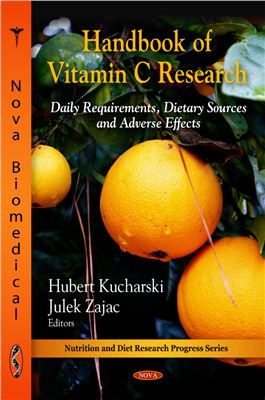Nova Biomedical Books, 2009, 415 pages
The 6-carbon lactone known as ascorbic acid (vitamin C) is an important water-soluble vitamin. It is essential for preserving optimal health and it is used by the body for many purposes, including collagen biosynthesis, melanin reduction and enhanced immunity. This book addresses some important issues related to various methods which are employed to encapsulate asorbic acid. A comparison of the characteristics of ascorbic acid nano and microparticles prepared by different methods is also given. Furthermore, the biomedical significance of human vitamin C metabolism is examined, in the light of polymorphisms in xenobiotic enzymes deduced from genetic, biochemical and epidemiological results to estimate optimal nutrition. Additionally, Vitamin C exerts a protective role against some types of cancer. For that reason, this book investigates the protective effect of vitamin C. Possible pro- and antioxidant effects of vitamin C is also presented and their extrapolation on human health is discussed. Other chapters in this book include a review of the role of vitamin C in the physiology of several diseases, good dietary sources of vitamin C, a study of the effects of environmental tobacco smoke (ETS) on vitamin C status in exposed populations and the role of vitamin C in human reproduction and its effect on people who suffer from epileptic seizures.
The 6-carbon lactone known as ascorbic acid (vitamin C) is an important water-soluble vitamin. It is essential for preserving optimal health and it is used by the body for many purposes, including collagen biosynthesis, melanin reduction and enhanced immunity. This book addresses some important issues related to various methods which are employed to encapsulate asorbic acid. A comparison of the characteristics of ascorbic acid nano and microparticles prepared by different methods is also given. Furthermore, the biomedical significance of human vitamin C metabolism is examined, in the light of polymorphisms in xenobiotic enzymes deduced from genetic, biochemical and epidemiological results to estimate optimal nutrition. Additionally, Vitamin C exerts a protective role against some types of cancer. For that reason, this book investigates the protective effect of vitamin C. Possible pro- and antioxidant effects of vitamin C is also presented and their extrapolation on human health is discussed. Other chapters in this book include a review of the role of vitamin C in the physiology of several diseases, good dietary sources of vitamin C, a study of the effects of environmental tobacco smoke (ETS) on vitamin C status in exposed populations and the role of vitamin C in human reproduction and its effect on people who suffer from epileptic seizures.

